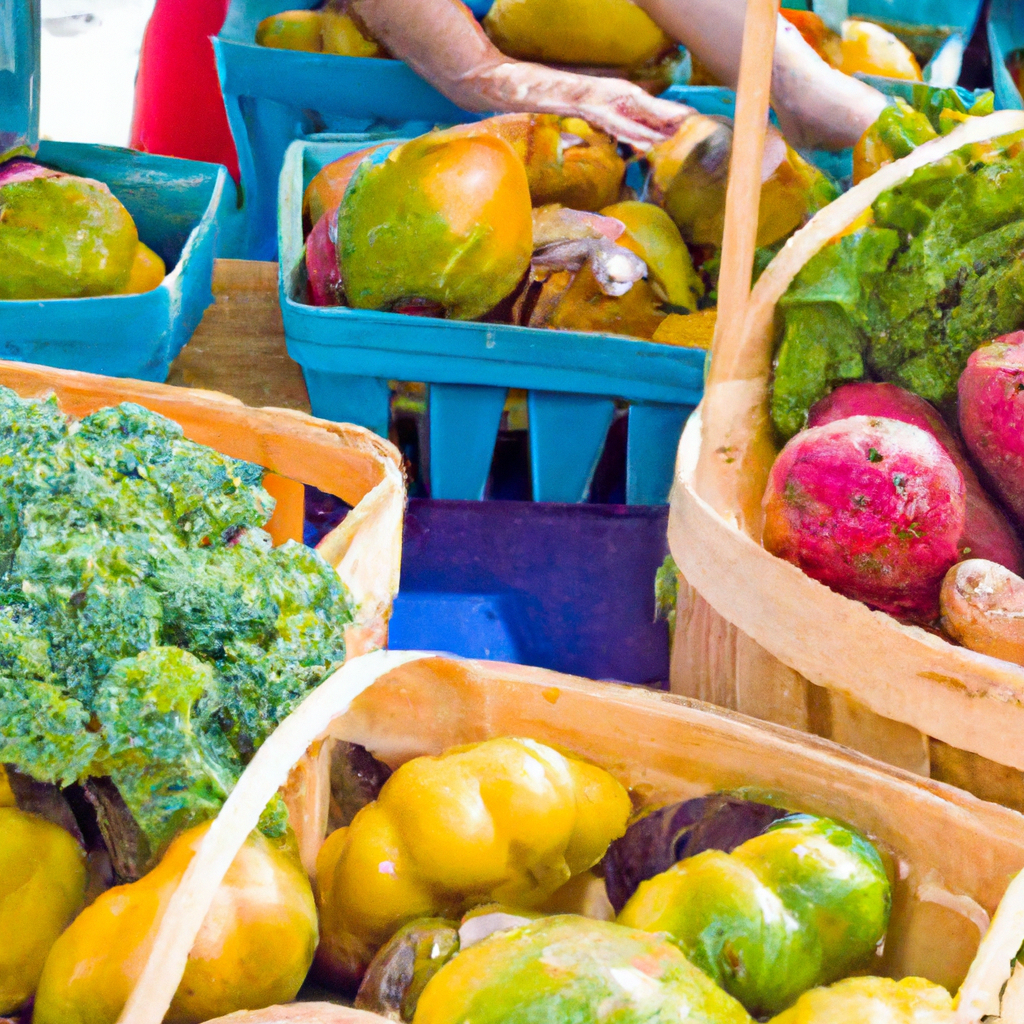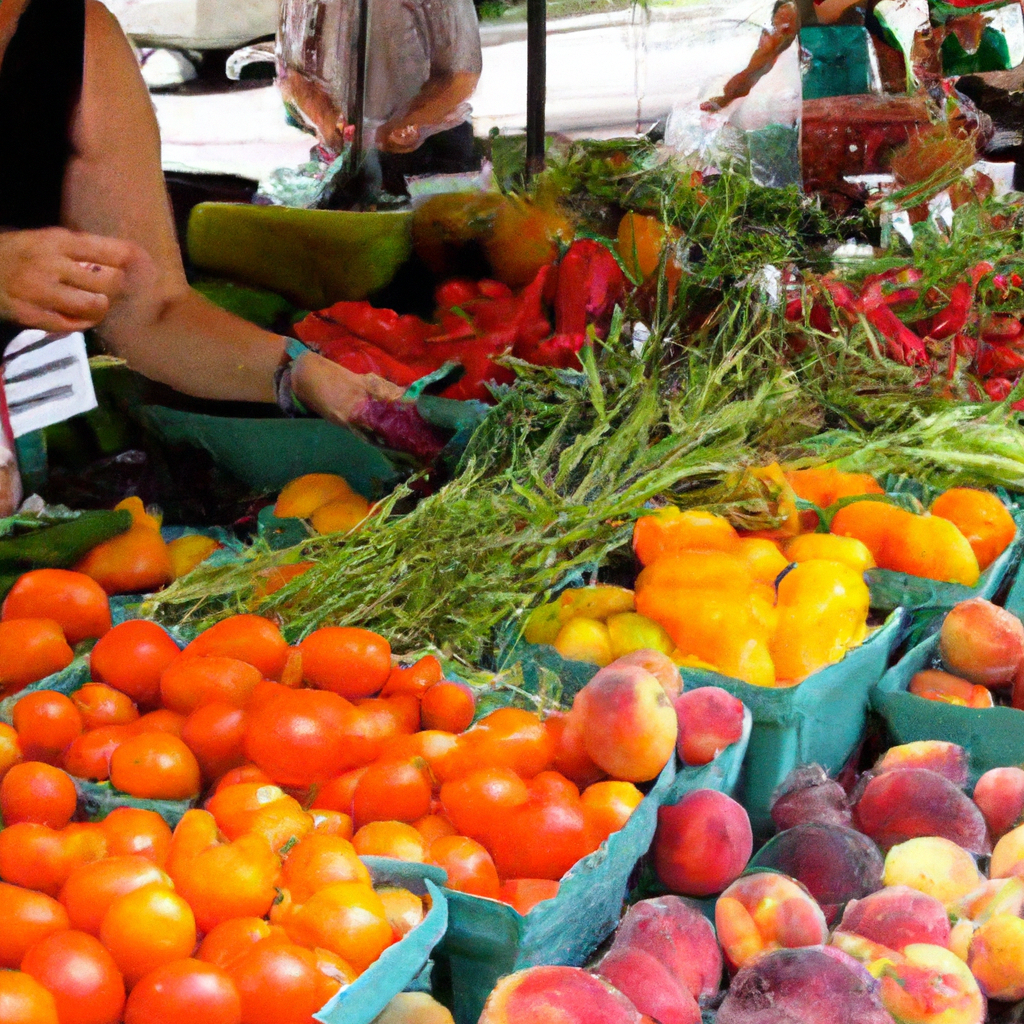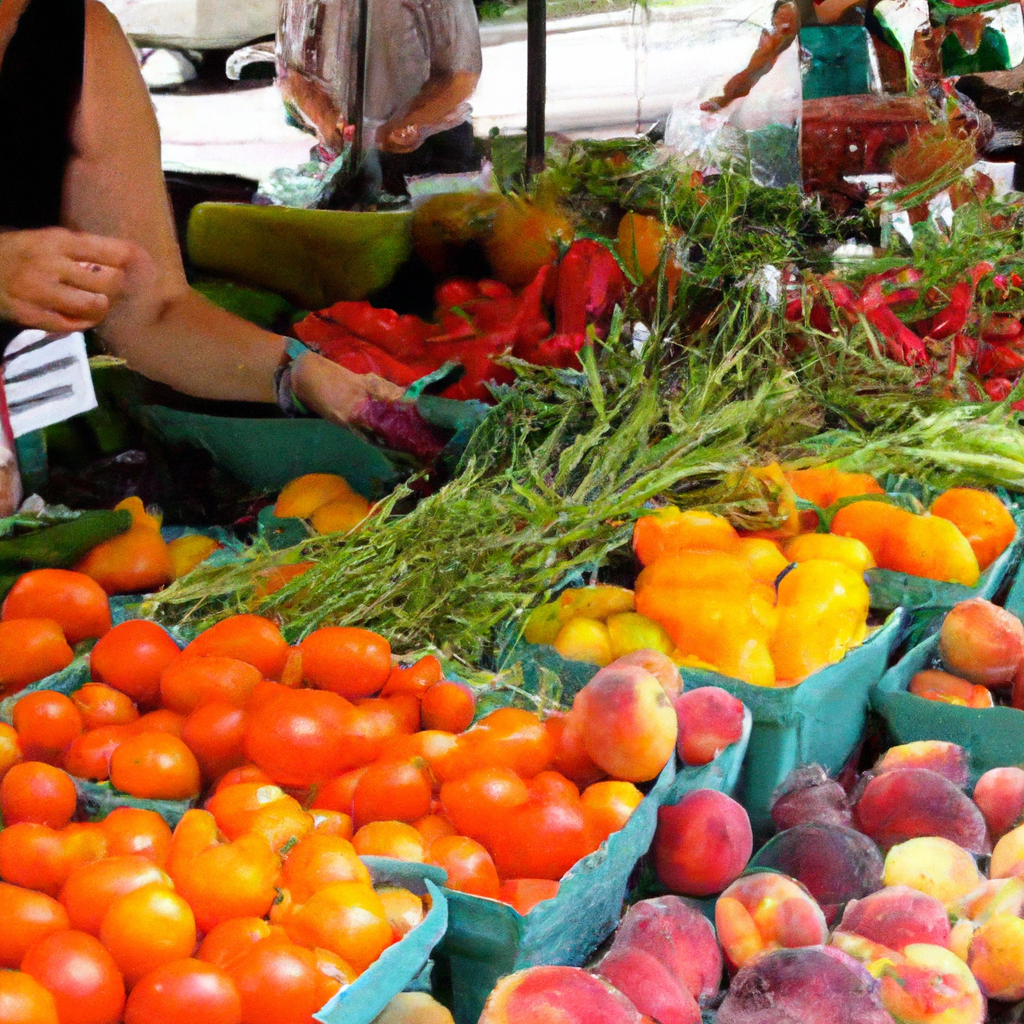Get ready to become a savvy shopper at farmers’ markets with the ultimate guide to unlocking their secrets. Discover tips and tricks to maximize your experience, from finding the freshest produce to supporting local farmers. With this insightful article, you’ll be equipped with the knowledge to make smart choices, explore new flavors, and create delicious meals straight from the farm to your table. So, let’s uncover the secrets that will enhance your shopping experience at farmers’ markets and bring joy to your kitchen.
Planning and Preparation
Researching Local Farmers’ Markets
Before heading out to a farmers’ market, it’s essential to do some research to find the best one in your area. Start by checking local directories, community forums, or even asking friends and neighbors for recommendations. Look for farmers’ markets that are known for their variety, quality, and commitment to supporting local producers. Consider factors such as location, accessibility, and the range of products available.
Checking Market Dates and Times
Once you’ve identified a few potential farmers’ markets, make sure to check their dates and times of operation. Farmers’ markets usually have specific hours, and some may only be open on certain days of the week. By knowing the market’s schedule, you can plan your visit accordingly and ensure that you don’t miss out on the freshest produce and other offerings.
Creating a Shopping List
To maximize your shopping experience at the farmers’ market, it’s helpful to create a shopping list beforehand. Take stock of the ingredients you already have at home and consider what you need for the upcoming week. Focus on seasonal produce, as it will be fresher and more flavorful. By having a shopping list, you can stay organized, avoid impulse purchases, and make sure you get everything you need.
Bringing Cash and Small Change
One crucial thing to remember when going to a farmers’ market is to bring cash, as not all vendors accept credit cards. ATMs may not be readily available at the market, so come prepared with enough cash to cover your purchases. Additionally, bring small change, as it will be useful for paying exact amounts and making transactions more convenient for both you and the vendors.
Navigating the Farmers’ Market
Arriving Early for the Best Selection
To have the widest variety and access to the freshest goods, it’s best to arrive early at the farmers’ market. By getting there when it opens, you increase your chances of finding the most sought-after items, such as limited produce, artisanal products, and popular bakery items. Plus, you’ll avoid the crowds and have more time to chat with the farmers and vendors.
Exploring the Layout
Farmers’ markets can be bustling with activity and offer a diverse range of stalls and vendors. Take some time to explore the layout of the market and get a sense of where different types of products are located. This way, you can plan your route accordingly and ensure that you don’t miss out on anything. Familiarize yourself with the different sections, such as the fruits and vegetables area, dairy products, and handmade items.
Interacting with Farmers and Vendors
One of the unique aspects of shopping at a farmers’ market is the chance to directly interact with the farmers and vendors. Take advantage of this opportunity to ask questions, learn about their products, and gain insights into their farming practices. Engaging with them not only helps you make informed choices but also builds connections and supports the local community.
Sampling and Asking Questions
Don’t be afraid to try samples of various products offered by the farmers and vendors. Sampling allows you to taste the quality and freshness of the produce and other items before making a purchase. Additionally, ask questions about how the products are grown or made, including whether they are organic, pesticide-free, or sustainably produced. The more you know, the better equipped you’ll be to choose the best options for yourself and the environment.
Comparing Prices and Quality
Farmers’ markets often have multiple vendors selling similar products. Take the time to compare prices, quality, and presentation among different stalls. Remember, the cheapest option isn’t always the best, as factors like farming practices, freshness, and taste also play a significant role. Consider the overall value and make your decisions based on a balance of quality and affordability.

Choosing Fresh and Seasonal Produce
Identifying Freshness Indicators
When it comes to selecting fresh produce at the farmers’ market, there are a few indicators to look out for. In general, fresh fruits and vegetables should have vibrant colors, firm textures, and a pleasant aroma. Avoid produce with bruises, blemishes, or signs of wilting. Additionally, ask the farmers about the harvesting methods and how recently the items were picked to ensure optimal freshness.
Understanding Seasonal Availability
One of the advantages of shopping at a farmers’ market is the abundance of seasonal produce. Different fruits and vegetables have peak seasons when they are at their freshest and most flavorful. Familiarize yourself with the seasonal availability of the items you’re looking for to make sure you’re getting the best quality. By eating seasonal produce, you’re also supporting local farmers and reducing the environmental impact of long-distance transportation.
Selecting Ripe Fruits and Vegetables
Choosing ripe fruits and vegetables requires a combination of visual cues and gentle touch. For example, ripe tomatoes should have a bright color, slightly firm texture, and a sweet aroma. Berries should be plump, vibrant, and free of mold. When selecting vegetables, look for crispness, firmness, and absence of blemishes. Trust your senses and don’t hesitate to ask the farmers for guidance on how to pick the best produce.
Inspecting for Quality and Avoiding Spoiled Produce
As you browse through the farmers’ market, pay attention to the overall quality of the produce on display. Ensure that the products are well-kept, properly stored, and free from signs of decay or spoilage. Avoid purchasing items that appear overly damaged, bruised, or past their prime. By carefully examining the produce, you can guarantee the highest quality and enjoy your purchases to the fullest.
Supporting Local Farmers
Learning About the Farmers’ Practices
Supporting local farmers goes beyond just purchasing their products. Take the time to learn about their farming practices and philosophy. Ask them questions about their methods of cultivation, whether they use pesticides or herbicides, or if they actively practice sustainable agriculture. By understanding their ethos and commitment, you can make more informed decisions and reinforce your support for environmentally-conscious practices.
Purchasing Directly from Farmers
One of the most significant advantages of shopping at farmers’ markets is the opportunity to buy directly from the farmers themselves. By skipping the middlemen, you can ensure that more of your money goes directly into the hands of the hardworking individuals who grow your food. This direct transaction not only supports local agriculture but also fosters a sense of community and connection with the people who nourish your community.
Asking About Sustainable and Organic Farming
If sustainability and organic farming practices are important to you, don’t hesitate to ask the farmers about their methods. Inquire about their use of chemical inputs, crop rotation techniques, soil health management, and any certifications they may have obtained. By actively seeking out farmers who prioritize sustainable and organic practices, you can contribute to the preservation of the environment and your own health.
Promoting Food Diversity and Biodiversity
By buying from local farmers, you play a crucial role in promoting food diversity and biodiversity. Many small-scale farmers cultivate unique and heirloom varieties that are not commonly found in supermarkets. By purchasing these different types of fruits, vegetables, and herbs, you help maintain biodiversity and ensure the preservation of traditional farming practices. Embrace the opportunity to try new flavors and support the richness of our food heritage.

Making Informed Purchases
Reading Labels and Certifications
When buying food products at a farmers’ market, it’s essential to read labels and look for any available certifications. Some farmers and vendors may have certifications indicating organic, non-GMO, or other specific attributes. Take the time to understand these labels and what they mean to ensure that your purchases align with your preferences and values.
Understanding Organic and Non-GMO
The terms “organic” and “non-GMO” are often used in the context of sustainable agriculture and food production. Organic produce is grown without the use of synthetic pesticides or fertilizers, and non-GMO products are made without genetically modified organisms. Familiarize yourself with these terms and their implications to make choices that align with your personal values and dietary choices.
Decoding Farmers’ Market Jargon
Farmers’ markets may sometimes have specific jargon or terms that can be confusing for newcomers. Take the opportunity to ask the farmers and vendors about any unfamiliar words or phrases. They are usually more than happy to explain and help you understand the unique aspects of their products. Building your knowledge will enhance your shopping experience and allow you to make more informed decisions.
Identifying Artisanal and Handmade Products
Farmers’ markets often offer more than just fresh produce. They are a treasure trove of artisanal and handmade products made by local craftspeople. From handcrafted soaps and candles to homemade cheeses and bread, these unique items are worth exploring. Look out for stalls that showcase these products and don’t hesitate to support local artists and artisans who contribute to the vibrant farmers’ market community.
Maximizing Freshness and Shelf Life
Properly Storing Perishable Items
To maximize the freshness and shelf life of your produce, it’s important to store them properly when you get home. Different fruits and vegetables have specific storage requirements. Some need to be refrigerated, while others are best stored at room temperature. Understanding these requirements will help you preserve the quality of your purchases and avoid unnecessary waste.
Extending Shelf Life with Storage Tips
Beyond proper storage, certain tips and tricks can help extend the shelf life of your farmers’ market finds. For example, place a damp paper towel in the bag with leafy greens to keep them hydrated and fresh. Keep fruits like apples away from ethylene-sensitive produce like lettuce to prevent premature spoilage. Explore online resources or ask the farmers for specific storage techniques to ensure your purchases stay fresh and delicious for as long as possible.
Avoiding Overbuying to Minimize Food Waste
While it can be tempting to buy an abundance of fresh produce at the farmers’ market, it’s important to avoid overbuying. Be realistic about your consumption capabilities and buy only what you can reasonably use before it spoils. By planning meals in advance and sticking to your shopping list, you can minimize food waste and ensure that every item you purchase gets the attention it deserves.
Utilizing Preservation Techniques
Preservation techniques can be valuable for extending the life of certain perishable items. Consider canning, freezing, pickling, or dehydrating surplus produce to enjoy them when they are out of season. Not only will this help reduce waste, but it will also allow you to savor the flavors of the farmers’ market all year round. Explore different preservation methods and experiment with recipes to make the most of your purchases.
Getting the Best Deals
Negotiating Prices with Farmers and Vendors
In some cases, farmers and vendors at farmers’ markets may be open to negotiation on prices, especially when you’re buying in larger quantities. However, it’s important to approach negotiations respectfully and be mindful of the value these hardworking individuals bring to your community. If you maintain a friendly and appreciative tone, you may be able to strike a mutually beneficial deal.
Taking Advantage of Special Offers
Farmers’ markets often have special offers or promotions that you can benefit from. Keep an eye out for discounts on certain items, bundle deals, or even a loyalty program that rewards frequent customers. These opportunities can help you make the most of your budget while supporting local farmers and vendors. Being aware of the special offers ensures that you don’t miss out on any great deals.
Bargaining towards Closing Time
Towards the end of the farmers’ market’s operating hours, some vendors may be willing to offer discounts to sell their remaining products. If you’re comfortable negotiating, this can be an excellent opportunity to grab some last-minute deals. It’s important to remember that vendors deserve fair compensation for their hard work, so be respectful and considerate when bargaining.
Exploring Bulk Buying Options
If you’re interested in buying in larger quantities, some farmers and vendors may offer bulk buying options. This can be an excellent opportunity to stock up on your favorite products, particularly items that have a longer shelf life or can be preserved easily. Discuss with the farmers or vendors to explore the possibilities and determine if bulk buying aligns with your needs and preferences.
Exploring Beyond Fruits and Vegetables
Discovering Artisan Foods and Products
While fruits and vegetables take center stage at farmers’ markets, don’t overlook the wide variety of artisan foods and products on offer. From homemade jams and preserves to handcrafted chocolates and pastries, these unique treats add an extra element of delight to your shopping experience. Use the opportunity to discover new flavors and support local artisans who bring creativity and passion to their craft.
Finding Local Dairy and Meat Products
Many farmers’ markets also feature a selection of local dairy and meat products. Explore stalls that offer farm-fresh eggs, artisanal cheeses, and free-range meats. By purchasing these items directly from local producers, you contribute to the sustainability of the local food system and can enjoy the assurance of knowing where your food comes from. Again, ask the farmers about their practices and production methods to make informed choices.
Exploring Handcrafted Non-Food Items
Farmers’ markets are not just about food. They also offer a platform for local artists and craftspeople to showcase their handcrafted non-food items. From handmade soaps and lotions to beautifully woven textiles and unique pottery, there is undoubtedly something for everyone. Take the time to wander through the stalls and appreciate the creativity and skill of these local artisans. Supporting their work helps foster a thriving community of artists and enriches your farmers’ market experience.
Engaging with the Community
Attending Farmers’ Market Events
Many farmers’ markets organize special events throughout the year to engage the community and celebrate local agriculture. These events may include live music performances, cooking demonstrations, workshops, or even themed festivals. Keep an eye out for these events and make a point to attend. They provide an excellent opportunity to meet like-minded individuals, learn new skills, and celebrate the bounty of the local food scene.
Joining Cooking Demos and Workshops
Participating in cooking demonstrations and workshops offered at farmers’ markets can be a fantastic way to enhance your culinary skills and learn new recipes. These sessions are often led by local chefs or passionate food enthusiasts who are eager to share their knowledge and inspire others. Embrace the opportunity to expand your culinary horizons, experiment with new ingredients, and savor the flavors of the farmers’ market in exciting ways.
Supporting Local Food Initiatives
Farmers’ markets are not only about shopping; they also play an integral role in supporting local food initiatives. These initiatives may include community gardens, food banks, nutrition programs, or sustainability projects. Take the time to learn about these initiatives and see how you can contribute. Whether it’s through volunteering, fundraising, or spreading awareness, every effort helps build a stronger and more resilient local food system.
Connecting with Like-minded Individuals
One of the beautiful aspects of farmers’ markets is the community it brings together. Engage with fellow shoppers, farmers, and vendors to forge connections with like-minded individuals who share your passion for local, sustainable, and delicious food. These connections can lead to valuable friendships, shared recipes, and a sense of belonging to a community that values and supports local agriculture.
Ensuring Food Safety
Inspecting Cleanliness of Stalls
Food safety should always be a top priority when shopping at a farmers’ market. Take a moment to observe the cleanliness of the stalls and surrounding areas. Check for general hygiene practices such as clean displays, gloved handling of food, and proper waste management. A clean and well-organized stall indicates that the farmer or vendor takes pride in their products and cares about their customers’ well-being.
Checking for Proper Handling and Storage
Ensure that the farmers and vendors are practicing proper handling and storage of their products. Perishable items, such as dairy and meat, should be kept at appropriate temperatures to prevent spoilage. Fruits and vegetables should be displayed in a way that minimizes the risk of cross-contamination. Don’t hesitate to ask questions about handling and storage methods to ensure that the products you purchase are safe for consumption.
Asking about Food Safety Practices
It’s important to have assurance when it comes to food safety. Take the opportunity to ask the farmers and vendors about their food safety practices. Inquire about their recommended storage methods, how they handle potential allergens, and whether they participate in any food safety training programs. Reliable farmers and vendors will happily share their procedures, demonstrating a commitment to providing safe and high-quality products.
Handling and Storing Food Safely
Once you’ve made your purchases, it’s crucial to handle and store the food properly to maintain its safety. Follow basic food safety guidelines such as washing your hands before and after handling the produce, separating raw and cooked foods, and avoiding cross-contamination. Be mindful of perishable items that may need to be refrigerated promptly, and store them at the appropriate temperatures to prevent spoilage and bacterial growth.
By following these tips and unlocking the secrets to shopping smart at farmers’ markets, you’ll not only enjoy the freshest and most flavorful produce but also support local farmers and artisans. Embrace the sense of community, explore new flavors, and savor the joy of discovering unique handmade goods. Shopping at farmers’ markets is more than just a transaction; it’s an experience that connects you to the people, the land, and the vibrant tapestry of your local food system.

